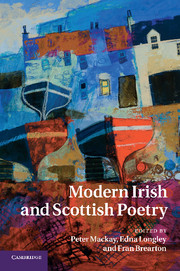Book contents
- Frontmatter
- Contents
- List of contributors
- Acknowledgements
- Introduction
- 1 Swordsmen: W. B. Yeats and Hugh MacDiarmid
- 2 Tradition and the individual editor: Professor Grierson, modernism and national poetics
- 3 Louis MacNeice among the islands
- 4 Townland, desert, cave: Irish and Scottish Second World War poetry
- 5 Affinities in time and space: reading the Gaelic poetry of Ireland and Scotland
- 6 Contemporary affinities
- 7 The Classics in modern Scottish and Irish poetry
- 8 Translating Beowulf: Edwin Morgan and Seamus Heaney
- 9 Reading in the gutters
- 10 ‘What matters is the yeast’: ‘foreignising’ Gaelic poetry
- 11 Outside English: Irish and Scottish poets in the East
- 12 Names for nameless things: the poetics of place names
- 13 Desire lines: mapping the city in contemporary Belfast and Glasgow poetry
- 14 ‘The ugly burds without wings’?: reactions to tradition since the 1960s
- 15 ‘And cannot say / and cannot say’: Richard Price, Randolph Healy and the dialogue of the deaf
- 16 On ‘The Friendship of Young Poets’: Douglas Dunn, Michael Longley and Derek Mahon
- 17 ‘No misprints in this work’: the poetic ‘translations’ of Medbh McGuckian and Frank Kuppner
- 18 Phoenix or dead crow? Irish and Scottish poetry magazines, 1945–2000
- 19 Outwith the Pale: Irish–Scottish studies as an act of translation
- Guide to further reading
- Index
- References
2 - Tradition and the individual editor: Professor Grierson, modernism and national poetics
Published online by Cambridge University Press: 18 April 2011
- Frontmatter
- Contents
- List of contributors
- Acknowledgements
- Introduction
- 1 Swordsmen: W. B. Yeats and Hugh MacDiarmid
- 2 Tradition and the individual editor: Professor Grierson, modernism and national poetics
- 3 Louis MacNeice among the islands
- 4 Townland, desert, cave: Irish and Scottish Second World War poetry
- 5 Affinities in time and space: reading the Gaelic poetry of Ireland and Scotland
- 6 Contemporary affinities
- 7 The Classics in modern Scottish and Irish poetry
- 8 Translating Beowulf: Edwin Morgan and Seamus Heaney
- 9 Reading in the gutters
- 10 ‘What matters is the yeast’: ‘foreignising’ Gaelic poetry
- 11 Outside English: Irish and Scottish poets in the East
- 12 Names for nameless things: the poetics of place names
- 13 Desire lines: mapping the city in contemporary Belfast and Glasgow poetry
- 14 ‘The ugly burds without wings’?: reactions to tradition since the 1960s
- 15 ‘And cannot say / and cannot say’: Richard Price, Randolph Healy and the dialogue of the deaf
- 16 On ‘The Friendship of Young Poets’: Douglas Dunn, Michael Longley and Derek Mahon
- 17 ‘No misprints in this work’: the poetic ‘translations’ of Medbh McGuckian and Frank Kuppner
- 18 Phoenix or dead crow? Irish and Scottish poetry magazines, 1945–2000
- 19 Outwith the Pale: Irish–Scottish studies as an act of translation
- Guide to further reading
- Index
- References
Summary
When T. S. Eliot sent a copy of his Collected Poems to Sir Herbert Grierson, it was inscribed ‘to whom all English men of letters are indebted’. The largest debt was to Grierson's edition of the poems of John Donne, published in 1912 when Grierson was Professor of English Literature at the University of Aberdeen. That edition made available for the first time trustworthy versions of Donne's poems and, in its introduction and notes, radically revised the value of Donne's contribution to poetry in English, presenting his work as ‘a poetry of an extraordinarily arresting and haunting quality, passionate, thoughtful, and with a deep melody of its own’. Grierson not only transformed Donne's historical reputation (and, by his anthology of Metaphysical Poetry in 1921, the estimate of much seventeenth-century poetry) but effectively encouraged Donne to be taken as the model for a properly modern poetry. Grierson himself put this down later to a ‘reaction against the smoothness of Tennyson like the reaction against Pope by Wordsworth and others. The moderns found inspiration in the “metaphysicals” and doubtless my edition had an influence.’
The real reaction, however, was against nineteenth-century conceptions of ‘beauty’, and what Grierson emphasised was that Donne manages to produce poetry without depending on beauty. Donne's previous critics had denied that he was
a great poet because with rare exceptions, exceptions rather of occasional lines and phrases than of whole poems, his songs and elegies lack beauty. Can poetry be at once passionate and ingenious, sincere in feeling and witty, – packed with thought, and that subtle and abstract thought, Scholastic dialectic? […]
- Type
- Chapter
- Information
- Modern Irish and Scottish Poetry , pp. 39 - 57Publisher: Cambridge University PressPrint publication year: 2011

